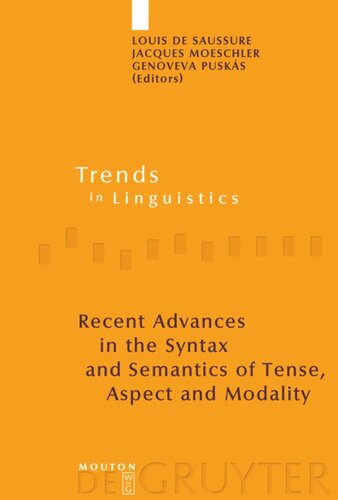

Most ebook files are in PDF format, so you can easily read them using various software such as Foxit Reader or directly on the Google Chrome browser.
Some ebook files are released by publishers in other formats such as .awz, .mobi, .epub, .fb2, etc. You may need to install specific software to read these formats on mobile/PC, such as Calibre.
Please read the tutorial at this link: https://ebookbell.com/faq
We offer FREE conversion to the popular formats you request; however, this may take some time. Therefore, right after payment, please email us, and we will try to provide the service as quickly as possible.
For some exceptional file formats or broken links (if any), please refrain from opening any disputes. Instead, email us first, and we will try to assist within a maximum of 6 hours.
EbookBell Team

4.3
38 reviewsIt is a fact that tense, aspect and modality together form one of the most recurring and active areas of research in contemporary syntax and semantics, as well as in other disciplines of linguistics. A large number of syntactic and semantic phenomena are concerned by the temporal-aspectual-modal level of representation: information about time, aspect and modality is part of virtually all sentences; inflexion is quite widely considered as the core of syntactic projections. Because of this very crucial situation and role in the sentence structure, temporal-aspectual and modal information concerns virtually any part of the sentence and this information has scope over the whole characterization of the eventuality denoted by the sentence.
This book is an up-to-date milestone for the studies of temporality and language, in particular regarding syntax and semantics, but with incidental hints to pragmatics and theories of human natural language understanding. Through this very tight selection of 15 papers (originally delivered during the 6th Chronos colloquium), tenses, aspect and modality are investigated both at the descriptive and theoretical levels, involving many different Indo-European and non-Indo-European languages. The volume sheds light on a wide array of phenomena that remained too little explored until now. These include the following: modal subordination in Japanese, epistemic modals in Dutch and English in Free Indirect Speech contexts, aspectual readings of idioms, adverb-licensing with the German perfect, French imperfective past compared with English progressive past, infinitival perfect in English, Adult Root Infinitives, economy constraints on temporal subordinations, future modality, past interpretation of present tense in embedded clauses, and time without tenses in Mandarin and Navajo.
The book is of interest to scholars and advanced students in the fields of linguistics (general linguistics, semantics, syntax) as well as philosophy and logic.